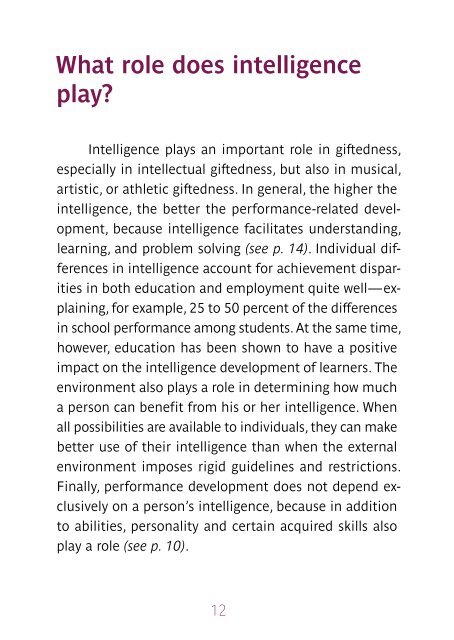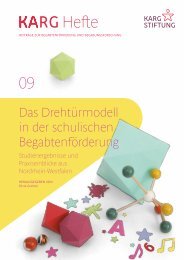FAQS: Frequently asked questions about giftedness
The Karg Foundation receives a lot of questions on the subject of giftedness—FAQs (Frequently Asked Questions)—far more often indeed than it did ten years ago. And this is a good thing! Many people involved in the educational processes of children have come to realize that giftedness can also be a fundamental personality trait of children and adolescents. The Karg Foundation wants to answer the questions you may have not only as educational and psychological professionals in educational institutions or working as educational providers, policy makers, or in training and further education institutes, but as parents and gifted people also: What is giftedness? How can it be identified? Who can provide advise for gifted children and their families? How can they be supported in the best possible way?
The Karg Foundation receives a lot of questions on the subject of giftedness—FAQs (Frequently Asked Questions)—far more often indeed than it did ten years ago. And this is a good thing! Many people involved in the educational processes of children have come to realize that giftedness can also be a fundamental personality trait of children and adolescents.
The Karg Foundation wants to answer the questions you may have not only as educational and psychological professionals in educational institutions or working as educational providers, policy makers, or in training and further education institutes, but as parents and gifted people also: What is giftedness? How can it be identified? Who can provide advise for gifted children and their families? How can they be supported in the best possible way?
Create successful ePaper yourself
Turn your PDF publications into a flip-book with our unique Google optimized e-Paper software.
What role does intelligence<br />
play?<br />
Intelligence plays an important role in <strong>giftedness</strong>,<br />
especially in intellectual <strong>giftedness</strong>, but also in musical,<br />
artistic, or athletic <strong>giftedness</strong>. In general, the higher the<br />
intelligence, the better the performance-related development,<br />
because intelligence facilitates understanding,<br />
learning, and problem solving (see p. 14). Individual differences<br />
in intelligence account for achievement disparities<br />
in both education and employment quite well—explaining,<br />
for example, 25 to 50 percent of the differences<br />
in school performance among students. At the same time,<br />
however, education has been shown to have a positive<br />
impact on the intelligence development of learners. The<br />
environment also plays a role in determining how much<br />
a person can benefit from his or her intelligence. When<br />
all possibilities are available to individuals, they can make<br />
better use of their intelligence than when the external<br />
environment imposes rigid guidelines and restrictions.<br />
Finally, performance development does not depend exclusively<br />
on a person’s intelligence, because in addition<br />
to abilities, personality and certain acquired skills also<br />
play a role (see p. 10).<br />
In other words, higher intelligence is a necessary but<br />
not sufficient condition for <strong>giftedness</strong>. Thus, defining<br />
<strong>giftedness</strong> in terms of intelligence (e.g., an IQ above 130)<br />
is considered outdated in many instances. There is also<br />
no natural threshold defining the point at which a person<br />
is gifted—just as there is no such threshold defining the<br />
height at which a person is exceptionally tall. Selecting a<br />
cutoff score, such as IQ 130, can be useful, for example, to<br />
compare groups of gifted and nongifted people in scientific<br />
research. Strict adherence to an IQ cutoff score for<br />
<strong>giftedness</strong>, however, makes sense neither in everyday life<br />
nor in <strong>giftedness</strong> programs, because one would hardly<br />
expect children with an IQ of 125 to perform differently<br />
than children with an IQ of 130 when they are essentially<br />
similar in all other respects.<br />
12 13
















